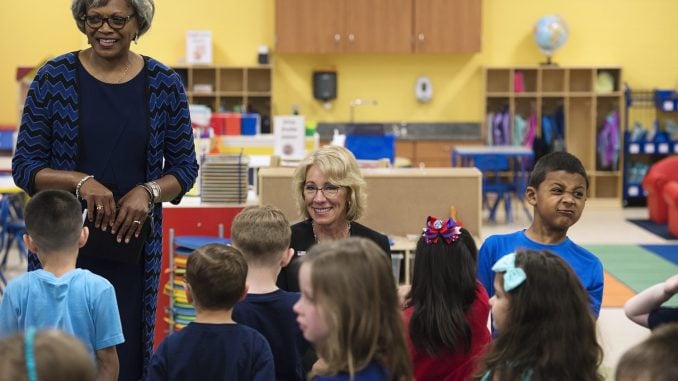
Visiting Fort Bragg Monday, Secretary of Education Betsy DeVos raised the issue of adding educational opportunities for children of military service members. While there are several advantages to being a young dependent of a parent in the Armed Forces, lack of educational choice can be a burden that hinders development and future opportunities
Children of service members, sometimes referred to as “military brats,” usually pride themselves on being above-average adapters to volatile change, but frequent moves can put tremendous strain on parents to find acceptable options for schooling. Depending on the situation, some families are forced to live farther from their duty station to find a better school. The out-of-pocket expenses too are a strain, especially for enlisted soldiers, sailors, airmen, and Marines who do not cash anything close to a big paycheck
DeVos made an essential point in a meeting with parents at Fort Bragg: local high schools “don’t necessarily work for every child. “ Many military bases offer kindergarten through sixth grade on base, while bigger bases, like Fort Bragg, often have middle schools. Some are controlled by regional school districts while others, especially overseas, are under the Department of Defense Educational Activity (DoDEA). Students enrolled at DoDEA schools generally outperform their peers in public schools
To offer a helpful personal anecdote, when my father was stationed at Hickam Air Force Base in Hawaii, after I completed sixth grade, I was bussed off the base to the middle school that served Hickam base housing. It was a less than ideal situation, as locals often clashed with military dependent students. Unlike schools on base, racial tensions were high, resulting in frequent fighting that escalated throughout the term. Classroom instruction at the school was below average and might be better described as poor. The state of Hawaii also ran the schools on base, but at least it was a more stable learning environment and much closer to home than the middle school
The 50th state too is not known for an exceptional public education. (Perhaps this is one reason why Barack Obama’s grandparents eschewed Hawaiian public schools so he could attend the elite Punahou prep school in Honolulu)
DeVos spoke out in support of South Carolina Sen. Tim Scott’s Choice Act, which would federalize school choice opportunities for children with disabilities, low-income households in D.C., and qualified dependents with a parent who is active duty military. “The CHOICE Act creates a Department of Defense pilot on at least five bases without DoD Education Activity schools to provide scholarships to students in military families on base of up to $8,000 for elementary and $12,000 for high school,” declared Scott
Because of her long advocacy for school choice, DeVos was a polarizing selection for Secretary of Education. Vice President Mike Pence had to cast the tie-breaking Senate vote to secure her confirmation. But this is an issue she knows well, and to her credit she came to Fort Bragg to address a pressing concern for military families. Few understand the positive intricacies of school choice issues like DeVos and her father was in the Air Force
North Carolina can immediately help by at least allowing for open enrollment for active-duty military families across the state. California, a state dominated by liberal Democrats, the party usually known for being in lock-step opposition to school choice, passed a bill to do just that in 2015. Furthermore, many activists and some citizens oppose school choice because they somehow believe charter schools or vouchers threaten public schools. Open enrollment only includes public schools. “We have a responsibility to ensure every child has access to a quality education, especially those children whose parents dedicate their lives to the service of our country” DeVos said at Fort Bragg. Military families often don’t have many choices about where they are stationed or where they live, so they should at least be empowered to have choices when it comes to the education of their children
Ray Nothstine is a member of the North State Journal’s editorial board, separate from the news staff. Unlike other newspapers, the North State Journal does not publish unsigned editorials; the author or authors of every editorial, letter, op-ed, and column is prominently displayed. To submit a letter or op-ed, see our submission guidelines



